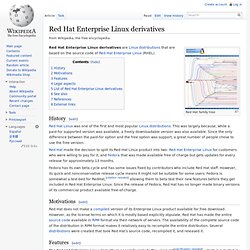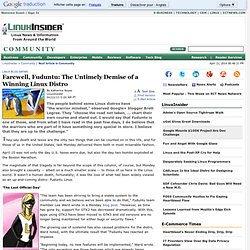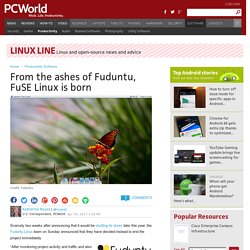

Red Hat Enterprise Linux derivatives. Red Hat family tree Red Hat Enterprise Linux derivatives are Linux distributions that are based on the source code of Red Hat Enterprise Linux (RHEL).

History[edit] Red Hat Linux was one of the first and most popular Linux distributions. This was largely because, while a paid-for supported version was available, a freely downloadable version was also available. Since the only difference between the paid-for option and the free option was support, a great number of people chose to use the free version. Fedora has its own beta cycle and has some issues fixed by contributors who include Red Hat staff. Motivations[edit] Red Hat does not make a compiled version of its Enterprise Linux product available for free download. Features[edit] The World's Open Source Leader. CentOS - The Community ENTerprise Operating System. Fedora Project Homepage. Fedora Codecs: installation. Fedora 19 alpha offers a peek at what's to come. It's been about three months since the release of Fedora 18 “Spherical Cow,” but this week afforded the first glimpse at the next version of the popular Linux distribution.

Arriving just a week behind schedule, the alpha version of Fedora 19, code-named "Schrödinger's Cat," comes packed with several new features as well as an assortment of updated packages. It's not intended for production use, of course. Rather, the alpha software is available purely for testing purposes. Still, if you want to take it for a whirl to see what's coming in the final release due in July, it's now available as a free download. Here are some of the highlights of what you'll find. 1. Included among the desktop environments available in the Fedora 19 alpha are GNOME 3.8, KDE Plasma Workspaces 4.10, and MATE 1.6. 2.
In addition to the main Fedora 19 OS, there are also a number of what the project calls “spins” with hand-picked application sets or customizations tailored for specific interests. 4. Korora Project. Korora 18: A screenshot tour. (Image: Screenshot by JA Watson/ZDNet) Korora Gnome The Distro Deluge that I wrote about a few weeks ago is continuing, with the release of Korora 18 last week and Debian 7.0.

For those who might not be familiar with it, Korora is based on Fedora, but with lots and lots (and lots) of additional packages included in the base installation. That makes it a particularly interesting distribution. There are four ISO images available, for Gnome 3 and KDE desktops in 32-bit and 64-bit versions. The images are large (1.6GB for Gnome, 2.2GB for KDE), but they are still hybrid ISO images, so you can dd them to a USB stick, or burn them to DVD media. Korora Linux: More Than Just Another Fedora Clone. By Jack M.

GermainLinuxInsider 07/31/13 5:00 AM PT I was much more impressed with Korora's KDE desktop version than the GNOME version. The KDE menu provided ready access to all of the features and software. Plus, the KDE desktop has a panel bar at the bottom of the screen. For example, the Software Manager, Apper, was readily available on the Favorites panel in the KDE menu. ManageEngine OpManager, a powerful NMS for monitoring your network, physical & virtual (VMware/ HyperV) servers, apps & other IT devices. Korora Linux has the potential to grow in popularity among users looking for a better, more user-friendly Linux distro that reaches beyond Fedora's enterprise appeal.
Korora 19, released on July 2, is an interesting Linux OS based on Fedora, the community version of parent company Red Hat's Enterprise Linux. For various design and community reasons, Fedora leaves out some popular user packages. Fuduntu. Farewell, Fuduntu: The Untimely Demise of a Winning Linux Distro. The people behind some Linux distros have "the warrior mindset," observed Google+ blogger Brett Legree.

They "choose the road not taken, ... chart their own course and stand out. I would say that Fuduntu is one of those, and from what I have read in the past few days, I do believe that the warriors who are part of it have something very special in store. I believe that they are up to the challenge. " ManageEngine OpManager, a powerful NMS for monitoring your network, physical & virtual (VMware/ HyperV) servers, apps & other IT devices.
From the ashes of Fuduntu rises FuSE Linux. Scarcely two weeks after announcing that it would be shutting its doors later this year, the Fuduntu Linux team on Sunday announced that they have decided instead to end the project immediately.

“After monitoring project activity and traffic and also reviewing all of the feedback from the community concerning our EOL, I have decided to end the project effective today,” wrote project team member Fewt in a weekend blog post. “This means that beginning with our last merge from testing to stable, which should happen today or tomorrow, there will be no additional updates to Fuduntu.” Fewer than 2500 users still have Fuduntu installed, Fewt noted, adding that “the majority of our user base has already moved on to other distributions.” As the project ends, one final update to those still using the Linux distribution will disable the Fuduntu stable repository to avoid a constant stream of error messages. Based on openSUSE Ikey Doherty/SolusOS.